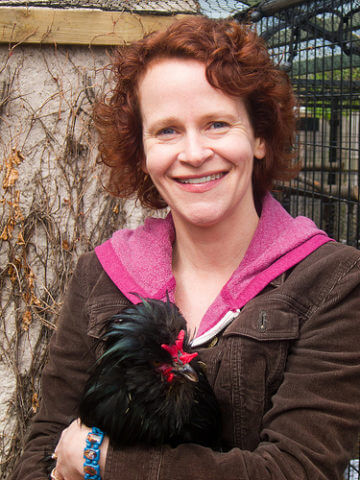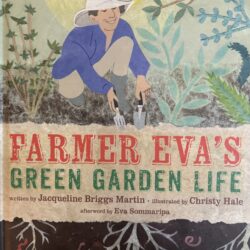There are so many reasons to tell you about this new book City Chickens (Houghton Mifflin Harcourt) by Christine Heppermann, just released two days ago:
1. It’s non-fiction (one of the main topics of this blog)–the story of a woman who lives in Minneapolis and runs a shelter for abandoned, lost– or found– chickens. And this story makes us glad that our wondrous world does contain at least one person who wants to give chickens a safe, comfortable home.
2. It’s about chickens. I love chickens, real and invented. Fictional chickens are the utility infielders of the children’s book world. They show up in all sorts of situations (even in my Chicken Joy on Redbean Road –illustrated by the super Melissa Sweet; Houghton Mifflin, 2007).
3. Christine loves chickens, too. And she is a very talented writer, who writes essays and reviews for the Horn Book, and has published a number of poems. I should also add she is a former student and a good friend. But I would tell you about this book if I had never met Christine because it is a wonderful non-fiction story, carefully researched, well-told, with striking photographs by Chris’s husband, Eric Hinsdale.
I want Christine to tell you about the book. So I asked her some questions.
1. JBM: What attracted you to this story?
CH: I’m always drawn to stories about people with uncommon passions or perceptions. Also to stories that show me something ordinary in an entirely new way. Most of us view chickens as commodities, valuable for what they give us—their meat and their eggs. But why shouldn’t we see them the way Mary and Bert at Chicken Run Rescue do—as living beings deserving of the same level of care and compassion that we give to dogs and cats? Truthfully, Jackie, your Snowflake Bentley stayed in my mind the whole time I was writing and researching City Chickens, because Wilson Bentley and Mary and Bert have a lot in common. Bentley took an amorphous mass of white stuff and showed us the beauty of each individual flake. Mary and Bert want people to recognize the beauty and uniqueness of each individual bird.
2. JBM: Why tell this as nonfiction instead of fiction?
CH: You know, the real-life characters are so compelling, I never once considered fictionalizing them. I love the challenge of taking actual people and events and trying to be true to them while at the same time constructing a narrative with all the literary qualities of fiction. At one point I worried because I didn’t have any child characters in the story, but then I found an actual child, Alison! (She and her family have adopted multiple birds from CRR.) And Alison had an actual rooster, Billiam, with more personality quirks than any character I could possibly have made up.
3. JBM: What was one of the really hard parts of writing this story?
CH: Choosing which chickens to feature. Because most every “guest” I met at Chicken Run Rescue had such a fascinating backstory. Originally I started the book with Gody, a little black hen who, for a time, lived in a St. Paul, Minnesota elementary school science classroom. The teacher acquired Gody after a friend-of-a-friend, a woman in Minneapolis, heard a cat yowling in her driveway. She went out to investigate and found Gody, panicked and shivering, hiding in a corner of her garage! But Gody had already come through Chicken Run Rescue and been adopted out to a family by the time I started my research, and there weren’t any good photos from her days in the classroom. Sadly, I had to deny her a starring role.
4. JBM: How does your interest in poetry show up in City Chickens?
CH: Certainly I chose words carefully and paid attention to the rhythm of the language, just as I do when I’m writing a poem. But more than that, I believe Mary and Bert are doing exactly what the best poets do: they are allowing us to see something through fresh eyes. They are saying, look at these creatures you’ve always taken for granted, aren’t they extraordinary?
Thanks, Christine. I think this book will change the way we see chickens. It will be much harder to think of chickens as “egg factories” after reading about Chicken Run Rescue. We will see more. And isn’t that one thing we are about–helping each other to see…more.



